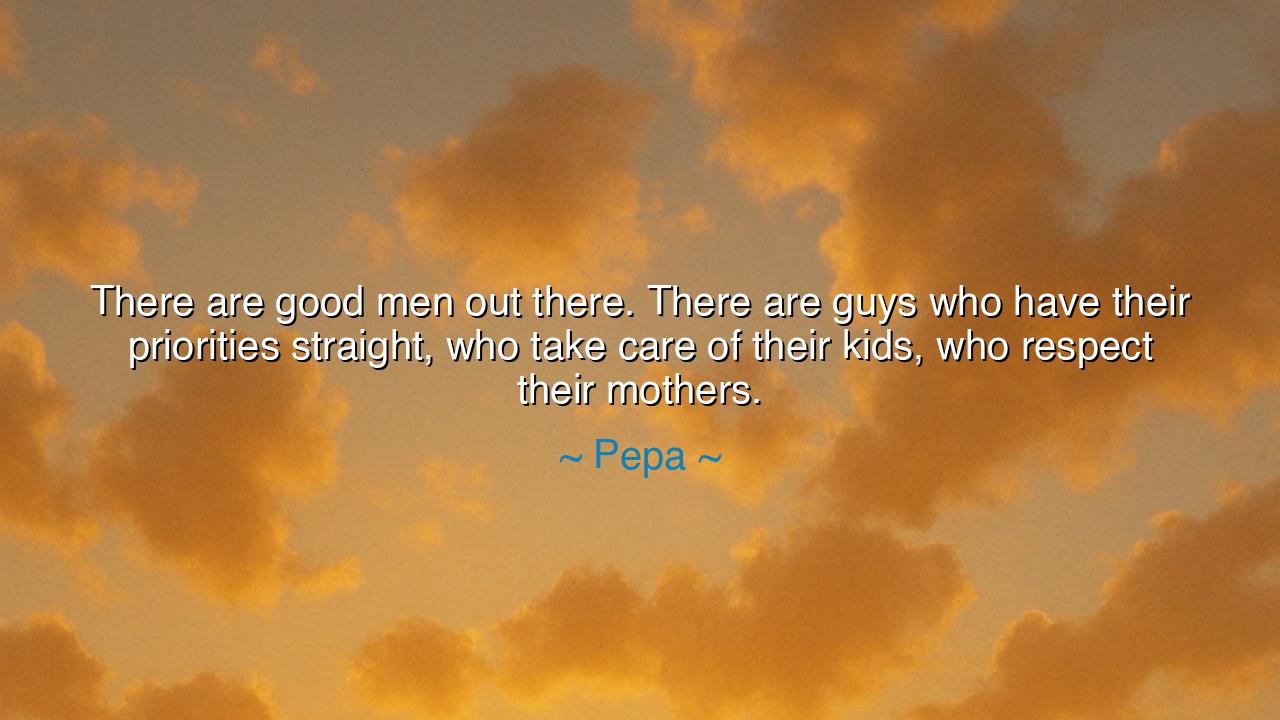
There are good men out there. There are guys who have their
There are good men out there. There are guys who have their priorities straight, who take care of their kids, who respect their mothers.






The words of Pepa—“There are good men out there. There are guys who have their priorities straight, who take care of their kids, who respect their mothers—rise like a beacon against the cynicism of our age. In a world that often magnifies corruption, betrayal, and selfishness, these words remind us that goodness still dwells among men, though it may not always make headlines. Pepa speaks with the tone of both lament and hope: lament for the many who fail these sacred duties, but hope for those who live them faithfully, quietly, heroically.
The ancients knew that a good man was not one of wealth or might, but one who lived in harmony with his responsibilities. Confucius taught that the noblest man was he who honored his parents, guided his children, and held fast to integrity. Likewise, the Roman Stoics proclaimed that virtue was measured not in public glory but in the private ordering of life—placing family above ambition, and duty above desire. Pepa’s words echo this ancient wisdom: a good man is he whose priorities reflect love, respect, and the courage to serve those entrusted to his care.
Consider the story of Marcus Aurelius, emperor of Rome. Though he ruled an empire stretching across continents, his writings in the Meditations show a man preoccupied not with conquest, but with being a worthy son, husband, and father. He wrote of the lessons he learned from his mother—piety, simplicity, and kindness—and of his duty to pass these virtues to his children. His greatness lay not only in governing millions, but in striving to live with respect and care for those closest to him. He embodied the truth that good men are revealed in how they treat family.
And history also remembers Abraham Lincoln, who, even as president, grieved the death of his child with tenderness and carried the memory of his mother as a guiding light. To take care of children and to respect one’s mother are not small acts but the roots of greatness. A man who forgets these duties, however great his public deeds, is hollow. A man who honors them, even if unknown to the world, shines with quiet nobility.
Yet Pepa’s statement also carries urgency: in a time when families fracture and responsibilities are neglected, we must not surrender to despair or cynicism. To proclaim that good men exist is to affirm that virtue is possible, that examples remain, and that hope must not be abandoned. It is to remind the community, especially the young, that role models still stand among us—fathers who guide, sons who honor, brothers who uplift. These are not merely men; they are pillars of civilization itself.
The lesson for us is clear. If you are a man, let your life prove these words true. Keep your priorities straight: love before vanity, family before self, respect before pride. Care for your children not only with provision but with presence; honor your mother not only with words but with deeds. If you are not a man but a witness, then honor and encourage those who live by this standard, for they carry burdens quietly that sustain the world more than warriors or kings.
Therefore, let us teach the next generation that a good man is not measured by riches or conquest, but by love, respect, and the courage of responsibility. Let us hold up those who embody this truth, so that the young may know goodness is real. Pepa’s words, though simple, are a reminder as timeless as scripture: that strength without compassion is hollow, but a man who loves, protects, and honors is the true hero of every age.






AAdministratorAdministrator
Welcome, honored guests. Please leave a comment, we will respond soon